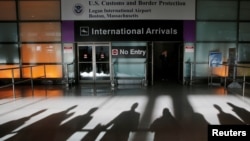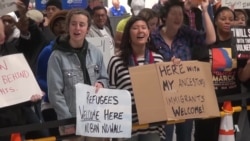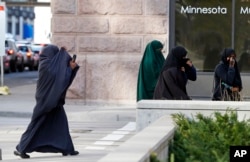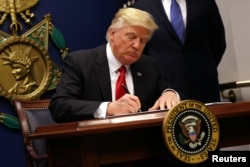Last Friday, Sudanese-born Nisrin Elamin, a PhD student at Stanford University, was returning to the United States from a research trip to her home country. She returned the same day President Donald Trump issued an executive order temporarily barring citizens from seven countries, including Sudan.
On arrival at Kennedy Airport in New York, she was briefly handcuffed, patted down and detained for five hours. Not knowing if she would be deported, she said she cried and felt humiliated.
Elamin said she is one of the lucky ones.
Watch: Congressional Democrats Tell Trump to End Travel Ban
“My experience pales in comparison to the vast majority affected by this order: the people who were sent back,” she said in a written statement to VOA. “To me this is a misguided policy targeting people from countries like my own, Sudan, where people are fleeing injustice, war and persecution.”
Elamin is one of tens of thousands of immigrants and visitors from countries affected by the president’s order. The order prohibits people from seven African and Middle Eastern countries from entering the United States for 90 days and halts the U.S. refugee resettlement for 120 days.
U.S. opinion evenly split
The order caused widespread chaos at airports over the weekend and prompted mass demonstrations in major U.S. cities. But many Americans are in favor of the order, according to a poll released Wednesday that showed public support at about 50 percent.
Murshid Barud, a Minnesota resident of Somali origin, backs the president’s action. Barud, who sits on the executive committee of the state’s Republican Party, says the best thing the United States can do is to help the Somalis already living here assimilate, instead of taking in more refugees.
“Those folks should be [examining] how we reintegrate those kids that are already here in the United States with no high school diploma, with no education, with no path to successful life, instead of bringing refugees that are going to have a very hard time in these tough times in the United States,” he told VOA.
Barud said the hundreds of thousands of Somali refugees across the Horn of Africa should try to build new lives in Somalia, despite the chronic chaos and violence there.
“Anybody who cares about the Somali refugees should actually help them resettle in their own home country,” he said. “And make sure that there is peace, security and prosperity in their home country."
Others say Trump’s intent has been distorted as being against Islam. This is partially due to the inflammatory rhetoric Trump used on the campaign trail.
But Mesfin Beshir, an Ethiopian-American and former refugee who ran for a state Senate seat in Massachusetts as a Republican, said he doesn’t believe the order is discriminatory against Islam.
“I think he's trying to act for prevention,” he said. “He is being proactive rather than reactive.”
African immigrant Charles Kambanda, an attorney of Rwandan origin practicing in New York, said the order is simply an expansion of policies under former President Barack Obama that identified people from the seven countries covered by Trump’s order for additional screening and questioning.
Kambanda pointed out that although the United States is a generous country that has historically taken in refugees, it has no obligation to do so if that could put its citizens at risk.
Does the order protect Americans?
Protecting Americans was the reason Trump cited for his directives. All of the countries affected by the travel ban have a history of hosting or supporting groups the United States has designated as terrorist, most notably al-Qaida and Islamic State.
However, John Cohen, former counterterrorism coordinator and acting undersecretary for intelligence and analysis at the U.S. Department of Homeland Security, said the order actually represents a break from the best practices adopted for screenings in recent years.
Authorities have moved away from country-specific vetting programs and focused more on intelligence-driven vetting based on the travel patterns and behaviors of potential terrorists, he said.
Cohen said that using such information helps officials focus their attention on people most likely to pose a threat.
“The problem with country-based vetting or country-based restrictions is that you are negatively impacting a large number of people who've done nothing wrong,” he said.
The order also creates ill will toward the United States, Cohen said, and does nothing to address the most likely perpetrators of future attacks: lone wolf attackers already living in the country.
“The primary terrorist threat facing the United States today comes from individuals who are already here, who become inspired by what they see on the internet and who carry out terrorist attacks in this country independent of any foreign terrorist organization,” Cohen said.
During the past two years, the United States has seen multiple attacks by people who fit that description, he said, such as the man who opened fire inside Orlando’s Pulse nightclub, killing nearly 50 people.
So Cohen is not a believer in Trump’s directives.
“This order, in particular the restrictions of travel from these countries, will do nothing to address that serious threat currently facing the U.S.,” he said.








